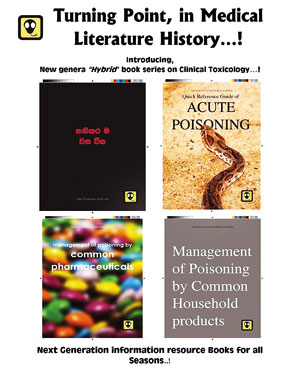e-books a new chapter for Toxicology & National Poisons Information Centre
View(s): ‘Hybrid Medical Pages’ or e-books are the latest contribution of the Toxicology & National Poisons Information Centre, based at the National Hospital of Sri Lanka, to keep up with rapidly changing times to play its role effectively in the prevention of poisoning.
‘Hybrid Medical Pages’ or e-books are the latest contribution of the Toxicology & National Poisons Information Centre, based at the National Hospital of Sri Lanka, to keep up with rapidly changing times to play its role effectively in the prevention of poisoning.
As the country enters the ‘National Poison Prevention Week’ tomorrow, with the theme ‘The use of web and social media in the prevention of poisoning’, the centre has used the vast potential of social media in its battle against poisoning.
‘Hybrid Medical Pages’ are the next step in the evolution of ‘health communication’, points out Dr. Waruna Gunathilake who heads the centre, explaining that the field of toxicology has witnessed an era of rapid scientific progress accompanied by a continuous flow of new knowledge.
“This arises against a backdrop of increasing emphasis on the importance of evidence-based practice. This poses challenges to the clinician. Thus to practise evidence-based medicine, information should be easily accessible and more vitally easily retrievable when the need occurs. These ‘Hybrid Medical Pages’ are meant to fulfil that need,” he says.
An inherent disadvantage of medical books being their inability to be up-to-date, the centre has overcome this issue by updating them continuously. These books also contain reference links to primary research articles which can be accessed online, he said.
The books include ‘Quick Reference Guide of Acute Poisoning’, ‘Management of Poisoning by Common Pharmaceuticals’, ‘Management of Poisoning by Common Household Products’ and ‘Thanikarama Vasa Visa’.
As printing of medical books takes time and whenever there is an update there will be a need to re-print these books, Dr. Gunathilake says that the trend set by the centre in launching e-books could be followed in medical education too.
Quoting a survey of the Census and Statistics Department, Dr. Gunathilake says that in the first half of last year (2015), the computer literacy rate was reported to be 26.8%, with the urban sector indicating the highest such literacy rate of 40.3%.
While the 226 state hospitals across the country have been registered in the official web-arm of the TOXBASE (Lanka), the first of its kind in Southeast Asia launched on January 1, this year, he says that it is exclusively designed for medical professionals and allows them to visit this open-access facility after securing a password. “Its public domain focuses on the general community providing information related to the prevention of common poisonings and other related health information on toxicology.”
As poisoning is a leading cause of death and hospitalization in Sri Lanka, the TOXBASE website can be accessed through the internet at any time of the day by healthcare professionals and the general public, in a bid to reduce illness and death due to poisoning, it is learnt.
Social media , meanwhile, have been active in the healthcare domain, says Dr. Gunathilake, adding that proof lies in more than 10,000 people viewing the Facebook account of the centre: www.facebook.com/NTPICSL within one year, while the most common mode of seeking advice was the mobile phone (78%).
For more information, please contact Phone: +9411143 or +94112691111 Ext 2430; E-mail: infotoxlanka@gmail.com; or access http://www.toxbaselanka.info


